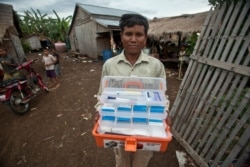Strains of malaria resistant to two key anti-malarial medicines are becoming more dominant in Vietnam, Laos and northern Thailand after spreading rapidly from Cambodia, scientists warned Monday.
Using genomic surveillance to track the spread of drug-resistant malaria, the scientists found that the strain, known as KEL1/PLA1, has also evolved and picked up new genetic mutations which may make it yet more resistant to drugs.
"We discovered [it] had spread aggressively, replacing local malaria parasites, and had become the dominant strain in Vietnam, Laos and northeastern Thailand," said Roberto Amato, who worked with a team from Britain's Wellcome Sanger Institute and Oxford University and Thailand's Mahidol University.
Malaria is caused by Plasmodium parasites which are carried by mosquitoes and spread through their blood-sucking bites.
Almost 220 million people were infected with malaria in 2017, according to World Health Organization estimates, and the disease killed 400,000 of them. The vast majority of cases and deaths are among babies and children in sub-Saharan Africa.
Malaria can be successfully treated with medicines if it's caught early enough, but resistance to anti-malarial drugs is growing in many parts of the world, especially in Southeast Asia.
The first-line treatment for malaria in many parts of Asia in the last decade has been a combination of dihydroartemisinin and piperaquine, also known as DHA-PPQ. Researchers found in previous work that a strain of malaria had evolved and spread across Cambodia between 2007 and 2013. This latest research, published in The Lancet Infectious Diseases journal, found it has crossed borders and tightened its grip.
"The speed at which these resistant malaria parasites have spread in Southeast Asia is very worrying," said Olivo Miotto, who co-led the work.
"Other drugs may be effective at the moment, but the situation is extremely fragile and this study highlights that urgent action is needed," he said.









